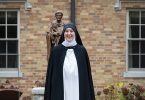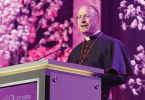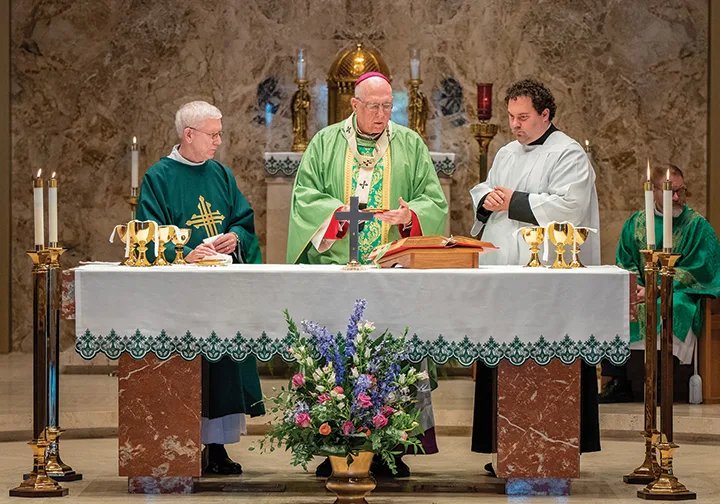
by Joe Bollig
joe.bollig@theleaven.org
KANSAS CITY, Kan. — Here’s a trick question for you: Are deacons essential? And the answer is . . .
“Sort of.” Or “It depends.” Or even, “No.”
Are you confused yet? Join the club. Plenty of Catholics know what a deacon is because they see them all the time in their parish — but will still call them “Father.” So at least there is some residual confusion.
Simply put, a deacon is an ordained minister in the Catholic Church — one of the three orders of ordained clerics, which include deacons, priests and bishops.
Each of these orders of clerics has functions of the word of God, sacraments and charity, but they fulfill them in different ways, according to “Frequently Asked Questions About Deacons” on the U.S. Conference of Catholic Bishops website.
Some of the confusion comes from two different kinds of deacons: transitional and permanent.
Generally, men on the path to priesthood are ordained transitional deacons some months or up to a year before being ordained priests. The diaconate is an essential step on the path to priesthood.
Permanent deacons, by contrast, are just that — permanent. They aren’t ordained priests. The permanent diaconate, dormant for centuries, was revived after the Second Vatican Council, which met from 1962-1965.
Deacons: We’ve got them
The Archdiocese of Kansas City in Kansas ordained its first cohort (or group) of permanent deacons on April 9, 2011. In some parishes, deacons are old news, but several archdiocesan parishes have never had permanent deacons.
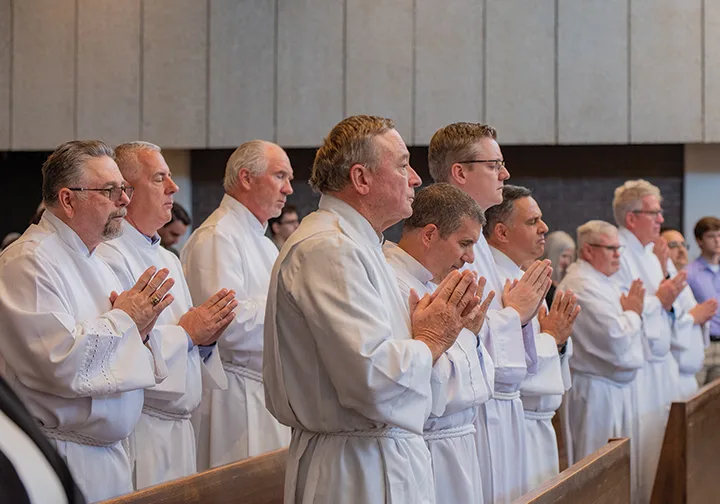
Permanent or transitional, all deacons do the same thing: proclaim the Gospel, preach, teach, baptize, lead the faithful in prayer, witness marriages (without a Mass), conduct wake and funeral services and assist the priest at the altar.
But they also do a variety of other things: lead classes for the Order of Christian Initiation for Adults (formerly RCIA), do marriage preparation for couples, do prison ministry, work with the homeless and more — a list as long as your arm.
The archdiocese has about 64 permanent deacons, according to Curtis Keddy, associate director of formation in the archdiocesan office of the permanent diaconate. That number fluctuates because of deaths, moves out of the archdiocese or other changes in ministry.
“Right now, we have 59 permanent deacons actively serving in the archdiocese,” said Keddy, himself a part of the fourth cohort trained in the archdiocese and scheduled for ordination this coming June.
Archdiocesan deacons tend to be married, often with children and full-time employment in secular occupations, albeit nearing retirement. Their average age is 63. A majority of the archdiocesan permanent deacons serve in Johnson County parishes.
For parish ministry, deacons are a vital enhancement but not essential, said Keddy.
Deacons: Do we need them?
Deacons cannot be reduced to “what one does,” but “who one is,” said Keddy.
But do we need deacons?
“That is a question a lot of people ask,” said Keddy. “It stems from a fundamental misunderstanding of the ordination of a deacon. On the day of ordination, little is said of what a deacon should do. But the right focus is on what a deacon should become.
“[The deacon] has been configured to Christ, shaped into an icon,” he said. “Whatever you do now will be a little revelation of the mystery of Christ the servant, not focusing on the duties or what [deacons] do.
“There’s nothing a deacon does that is unique to just a deacon. Anything a deacon does a priest or layperson can do. If you focus on the utility of a deacon that way — the necessity of a deacon — what you end up seeing is either an underqualified priest or an overqualified layperson. And that’s one of the big issues we face today . . . developing the diaconal imagination.”
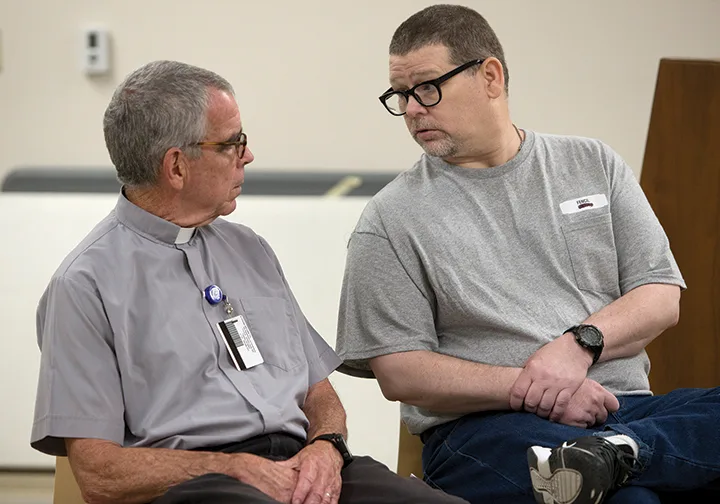
So, in a sense, deacons are not essential because many parishes function perfectly well without them. Priests who have deacons in their parish, however, are glad to have them.
Deacons: A complete asset
Deacons have been “a complete asset” at his parish, said Father Richard Storey, pastor of Curé of Ars Parish in Leawood.
“They provide great service,” said Father Storey. “The parish is totally comfortable with their role, which is completely to serve.”
Curé of Ars currently has two: Deacon Philip Nguyen and Deacon Kevin Cummings. A third, Deacon Steve White, died in 2022. Four parishioners are currently in formation to be ordained deacons, and Father Storey would love to have at least three of them serve in the parish.
“That will be up to the archbishop,” he said. “The parish is big enough that we could use three more.”
Deacons have two assignments. The first is to their parish, and the second is to some sort of ministry to the archdiocese. Deacon Nguyen frequently assists Archbishop Naumann as a master of ceremonies, and Deacon Cummings is on the board of directors of Project Gabriel and a maternity home in Missouri.
Deacon Nguyen has a family and works full time; Deacon Cummings is a retired dentist. Each man gives his time as he is available. Both help with weekend Masses.
“My deacons preach once a month,” said Father Storey. “It’s beautiful. I get to sit and listen to a homily. . . . Their homilies have been just excellent.”
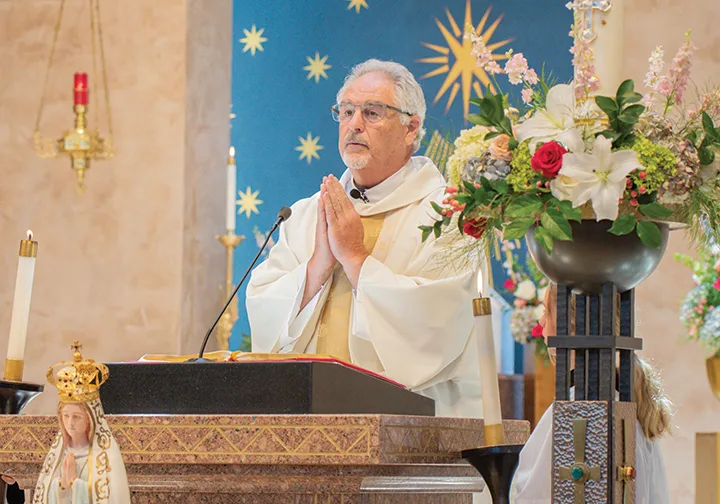
Deacons are particularly useful in big parishes where there is a lot of sacramental work, Father Storey said. As a pastor, he’s constantly busy, and it’s a big help when a deacon can lead a Holy Hour and other devotions, or preside at weddings, funerals and baptisms.
They also do more mundane things, such as making sure there is bread, wine and other items necessary for liturgies.
“Deacon Nguyen [once] worked full time for three months for us,” said Father Storey. “That was beautiful. My gosh, that was a great assignment for me. He was able to take so much work off my desk. He truly is a man of service, and the parish respects him so much.”
Deacons: We need help
How did the clerical rank of deacon come about anyway? Because the apostles needed help, as recorded in Acts of the Apostles (6:1-6).
“The deacons were instituted [according] to the Scriptures in the early church, and their job is to serve,” said Father Adam Wilczak, pastor of Divine Mercy Parish in Gardner. “By a special gift of the Holy Spirit, a lot of the work they do is supported and lifted up by God’s grace, to be a constant reminder of the universal call to serve that we all receive at our baptism.”
Father Wilczak is assisted by two deacons, both ordained in 2020. Deacon Vince Hallouer is retired and has a jail and prison ministry. He has a wife and adult children. Deacon Jason Imlay has secular employment and is on the board of at least three organizations. He is married and has three children.
The deacons play an important role in supporting both the mission and vision of the pastor as well as those of the archbishop.
“They do that through their parish assignments, assisting the pastor in his day-to-day role, such as the celebration of baptisms and witnessing marriages outside of Mass,” said Father Wilczak. “They’re also able to give Benediction with the Eucharist and assist at many parishes, including our own, with regular Holy Hours, giving people an opportunity to encounter Christ in the Eucharist, which is especially important during this time of revival.”
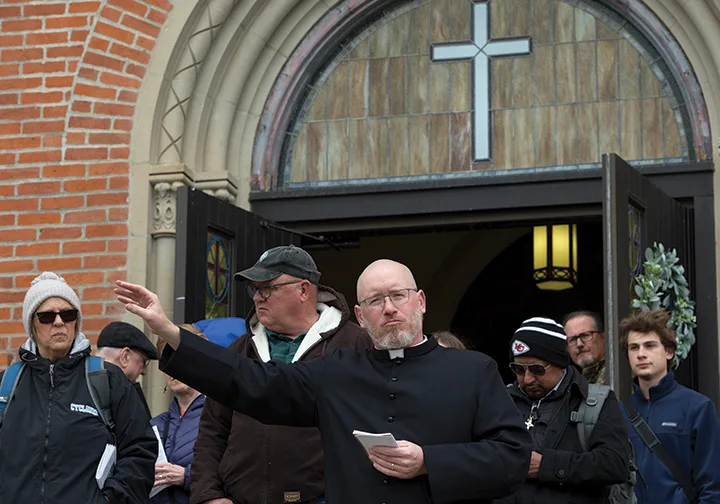
Because deacons work in the world and have families, and are clerics as well, they can relate to laypeople in ways priests cannot, said Father Wilczak.
What would happen if he had no deacons?
“I would be stretched more thinly,” he said. “It would limit my availability to parishioners in different capacities. They help with most of our baptisms, which frees me up to visit our classes during religious education on Sundays, and again assist with a lot of our Holy Hours, which we would not be able to hold as regularly if they were not in the parish. The parish would also experience fewer styles of preaching if I were the only one preaching, as opposed to the deacons sharing their gifts.”
Does he want more deacons?
“It’s hard to say no to more help,” said Father Wilczak. “We’re in a good position now, but if another one or two were assigned, it would not be a problem at all.”
Deacons: A bridge between two worlds
Once upon a time Father Thomas Aduri was a “Lone Ranger.”
“When I was a pastor in a previous parish, I did all the baptismal preparation and baptisms, all the RCIA classes, setting up Mass and seeing that all the ministers were in place,” said Father Aduri, now pastor of Mother Teresa of Calcutta Parish in Topeka.
“Now that I have deacons,” he continued, “they help me in all these things.”
The deacons at his parish have been a big help. He has two: Deacon Tim Ruoff and Deacon Brad Sloan.
For Father Aduri, deacons are both useful and essential. In addition to their well-defined roles, they have also done many other things. But as others have pointed out, it’s not just what they do that makes them essential to him — it’s who they are.
“When I first had the deacons, they said their role was to be [that connection] between priests and the people,” said Father Aduri. “They know married life and clerical life. They can be that bridge between clergy and laypeople.”
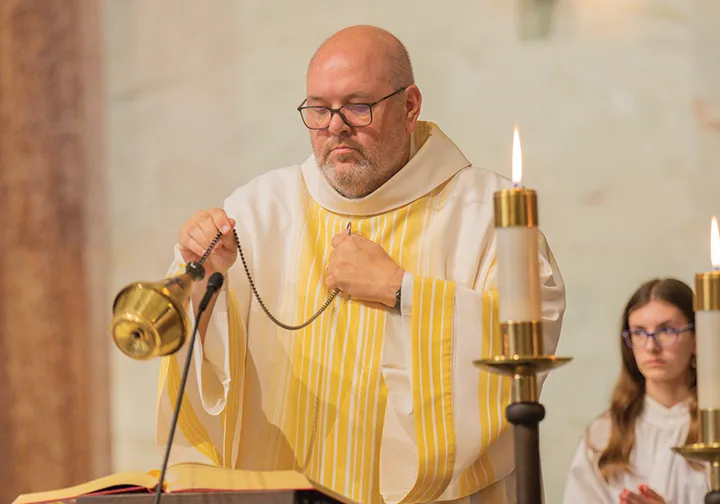
But that means there are times, because of family and work responsibilities, that the deacons are not available. Father Aduri works with this.
“If a deacon says, ‘I can’t do this,’ I definitely can’t make them,” he said. “They have their jobs and families.”
Deacons are no longer a novelty at Mother Teresa, and parishioners are not confused as to the roles of deacons and priests.
“[Parishioners] have accepted them,” said Father Aduri. “If we don’t have one at Mass, they think it’s weird. ‘Why is [Father] by himself?’ Now they are part of the liturgy.”
Some have suggested that deacons might be an answer to the priest shortage, but Father Aduri doesn’t see it that way.
“No, it’s a whole different commitment and sacrament to be a priest, and a different calling,” said Father Aduri. “I don’t see [deacons] as a remedy for a shortage of priests.”
“Deacons are definitely not a remedy [to a priest shortage] because deacons cannot celebrate Mass or hear confessions,” said Keddy.
“What they can do is provide support to overburdened and overworked pastors,” he added. “That being said, deacons do not have a ‘presidential’ role. They don’t preside. They are not meant for governance. They are servants.”
Deacons: Are you called?
There is interest among the laymen of the archdiocese in becoming deacons, but not everyone is called or suited for the role.
“When we open for applications, we get a very good number of men who apply,” said Keddy. “But we always whittle that down to 30, and even more after application. Formation for the diaconate is not a way to grow in your faith, or an extended retreat experience or a men’s group.
“It’s a self-emptying, sacrificial reconfiguration of your whole being. It’s like preparing for death. You are no longer your own — you belong to Christ and the church in a new way.”
The archdiocesan office of the permanent diaconate is looking for spiritually mature men with a sense of interiority and holiness. They’re already there and are ready to take the next step.
“We keep the bar pretty high,” said Keddy. “The last thing we need are mediocre or bad deacons.”



